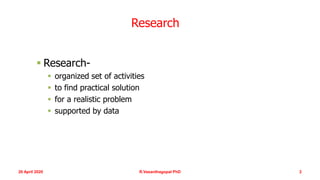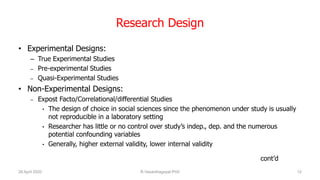Research Process in Social Science Research
- 1. Research Process in SOCIAL SCIENCE RESEARCH R.VASANTHAGOPAL PhD University of Kerala
- 2. 26 April 2020 R.Vasanthagopal PhD 2 Research Research- organized set of activities to find practical solution for a realistic problem supported by data
- 3. Research Process The research process ongoing planning searching discovery reflection synthesis revision and Learning Cont’d 26 April 2020 R.Vasanthagopal PhD 3
- 4. Research Process 26 April 2020 R.Vasanthagopal PhD 4 Formulating the Hypotheses Asking the research Question Examine a social relationship, study the relevant literature Collecting DataEvaluating the Hypotheses Analyzing Data Develop a research design Contribute new evidence to literature and begin again THEORY
- 5. Research Question, Hypothesis and Specific Aim A Research Question is a statement that identifies the phenomenon to be studied Eg: Are the researchers who utilize an online grant writing tutorial get higher priority scores on their next grant application than those who do not? A well-thought-out and focused research question leads directly into your hypothesis Eg: Those researchers who utilize an online grant writing tutorial will have higher priority scores on their next grant application than those who do not. If you have good hypotheses, they will lead into your specific aims Specific aims are the steps you are going to take to test your hypotheses Eg: Conduct a rigorous empirical evaluation of the online grant writing tutorial, comparing outcome and process measures from two groups—those with exposure to the tutorial and those without cont’d 26 April 2020 R.Vasanthagopal PhD 5
- 6. Research Question, Hypothesis and Specific Aim 26 April 2020 R.Vasanthagopal PhD 6
- 7. The Role of Theory in Research Theory is a model or framework for observation and understanding Theory is a generalised statement that asserts a connection between two or more types of phenomena – any generalised explanatory principle. Theory is a system of interconnected abstractions or ideas that condenses and organises knowledge about the world. Theory explains and predicts the relationship between variables. 26 April 2020 R.Vasanthagopal PhD 7
- 8. The Role of Theory in Research 26 April 2020 R.Vasanthagopal PhD 8 REEARCH QUESTION What am I going to study? EVIDENCE What data do I need to answer my question? EMPIRICAL EVIDENCES Who has done research in this area before METHODS How am I going to generate and analyse this data? Problem / concept definition Findings / conclusions Areas for further research THEORY What existing ideas are there about my research problem? Frameworks for understanding / explaining patterns and relationships Problem / concept definitions Data generated and relevance to research question Methods / techniques used Problems experienced
- 9. Relationship between Theory and Research Theory - provides basic concepts and directs us to the important questions. suggests ways for us to make sense of research data. enables us to connect a single study to the immense base of knowledge to which other researchers contribute. helps a researcher see the forest instead of just a single tree. increases a researcher’s awareness of interconnections and of the broader significance of data. 26 April 2020 R.Vasanthagopal PhD 9
- 10. The Role of Hypothesis in Research A proposition is a statement about observable phenomena (concepts) that may be judged as true or false. When a proposition is formulated for empirical testing, we call it a hypothesis. Hypotheses are tentative answers to research questions The hypothesis that the experimental treatment has no effect is called the null hypothesis (Denoted as Ho); The one that has effect is called the alternate hypothesis (Denoted as H1) It guides the direction of the study. It identifies facts that are relevant and those that are not. It suggests which form of research design is likely to be most appropriate. It provides a framework for organizing the conclusions that result 26 April 2020 R.Vasanthagopal PhD 10
- 11. Research Design The blueprint/roadmap that will guide the research. The test for the quality of a study’s research design is the study’s conclusion validity. Internal-Whether the research findings accurately reflect the research variables. External Validity – Generalizability of the findings to the intended/appropriate population/setting cont’d 26 April 2020 R.Vasanthagopal PhD 11
- 12. Research Design • Experimental Designs: – True Experimental Studies – Pre-experimental Studies – Quasi-Experimental Studies • Non-Experimental Designs: – Expost Facto/Correlational/differential Studies • The design of choice in social sciences since the phenomenon under study is usually not reproducible in a laboratory setting • Researcher has little or no control over study’s indep., dep. and the numerous potential confounding variables • Generally, higher external validity, lower internal validity cont’d 26 April 2020 R.Vasanthagopal PhD 12
- 13. Research Design How do you achieve internal and external validity? By effectively controlling 3 types of variances: Variance of the INDEPENDENT & DEPENDENT variables (Systematic Variance) Variability of potential NUISANCE/EXTRANEOUS/ CONFOUNDING variables (Confounding Variance) Variance attributable to ERROR IN MEASUREMENT-instrument/response error (Error Variance) cont’d 26 April 2020 R.Vasanthagopal PhD 13
- 14. Research Design Guiding principle for effective control of variances (or effective research design) is: The MAXMINCON Principle – MAXimize Systematic Variance – MINimize Error Variance (Conduct validity and reliability tests) – CONtrol Variance of Nuisance/Extraneous/ Exogenous/Confounding variables cont’d 26 April 2020 R.Vasanthagopal PhD 14
- 15. Research Design Effective research Design- Adequate (full range of) variability in values of research variables, Precise and accurate measurement, Identifying and controlling the effects of confounding variables, and Appropriate subject selection 26 April 2020 R.Vasanthagopal PhD 15
- 16. Data and Data Collection Fundamentally--2 types of data Quantitative – Numbers, tests, counting, measuring Qualitative – Words, images, observations, conversations, photographs Data Collection Techniques Observations Tests Surveys Document analysis(the research literature) 26 April 2020 R.Vasanthagopal PhD 16
- 17. Analysis of Data Descriptive statistics Used to describe what's going on in our data Central Tendency(Mean, Median,Mode) Dispersion (Range, Standard Deviation) Inferential statistics Used to make inferences from our data to more general conditions t-test, ANOVA, MANOVA, ANACOVA, Regression analysis, Correlation, etc 26 April 2020 R.Vasanthagopal PhD 17
- 18. Evaluating the Hypotheses State hypotheses H0: Reading to young children will decrease or not change IQ scores. H1: Reading to young children will increase IQ scores. Set criterion for rejecting H0 a = .05, level of significance (zCV = +1.645) critical value for area = .05 Compute statistics(p value) Interpret Results Is p value in the critical region? yes reject H0, accept H1 These data suggest that reading to young children does increase IQ. 26 April 2020 R.Vasanthagopal PhD 18


















